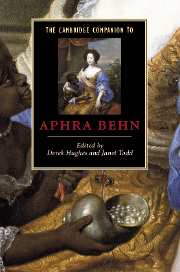Book contents
- Frontmatter
- 1 Aphra Behn: The Documentary Record
- 2 Behn, women, and society
- 3 Aphra Behn and the Restoration theatre
- 4 The political poetry of Aphra Behn
- 5 Behn’s dramatic response to Restoration politics
- 6 Tragedy and tragicomedy
- 7 Behn and the unstable traditions of social comedy
- 8 The Cavalier myth in The Rover
- 9 ‘The story of the heart’: Love-letters between a Noble-Man and his Sister
- 10 Oroonoko: reception, ideology, and narrative strategy
- 11 ‘Others’, slaves, and colonists in Oroonoko
- 12 The short fiction (excluding Oroonoko)
- 13 Pastoral and lyric: Astrea in Arcadia
- 14 Aphra Behn’s French translations
- Further reading
- Index
- Series list
5 - Behn’s dramatic response to Restoration politics
Published online by Cambridge University Press: 28 May 2006
- Frontmatter
- 1 Aphra Behn: The Documentary Record
- 2 Behn, women, and society
- 3 Aphra Behn and the Restoration theatre
- 4 The political poetry of Aphra Behn
- 5 Behn’s dramatic response to Restoration politics
- 6 Tragedy and tragicomedy
- 7 Behn and the unstable traditions of social comedy
- 8 The Cavalier myth in The Rover
- 9 ‘The story of the heart’: Love-letters between a Noble-Man and his Sister
- 10 Oroonoko: reception, ideology, and narrative strategy
- 11 ‘Others’, slaves, and colonists in Oroonoko
- 12 The short fiction (excluding Oroonoko)
- 13 Pastoral and lyric: Astrea in Arcadia
- 14 Aphra Behn’s French translations
- Further reading
- Index
- Series list
Summary
Aphra Behn was a staunch Tory at the time when Toryism first developed. In the late 1670s and early 1680s, the country was in the grip of the Exclusion Crisis, as Whigs tried to exclude the Catholic James from succeeding to his brother Charles II's throne, and Tories defended the Stuarts. To put it crudely, Whigs (while mostly monarchists not republicans) saw Catholicism and arbitrary government as the main threats, and prioritized patriotism and parliamentary 'liberties'. Tories placed a premium on kingly authority and class hierarchy, seeing the Whig challenge as raising the spectre of renewed civil war. As the political balance shifted to and fro, many dramatists shifted their allegiance with it; but Behn was a more fervent Tory than the rest. So staunch was she, indeed, that in August 1682 a warrant was issued for her arrest for effectively being too vehement in the King's support. She had written an epilogue to the anonymous play Romulus and Hersilia in which she criticized Charles's bastard son, the Duke of Monmouth, for being in league with the Whigs. Charles was not ready for such assiduity. Even at the end of her life, when she was ill and poor and the Stuarts had been deposed by William of Orange in the so-called Glorious Revolution of 1688, Behn refused an invitation to write verse glorifying William's accession and instead wrote an ambiguous poem in which the refusal to praise William at all was the most remarkable feature.
- Type
- Chapter
- Information
- The Cambridge Companion to Aphra Behn , pp. 68 - 82Publisher: Cambridge University PressPrint publication year: 2004
- 4
- Cited by



